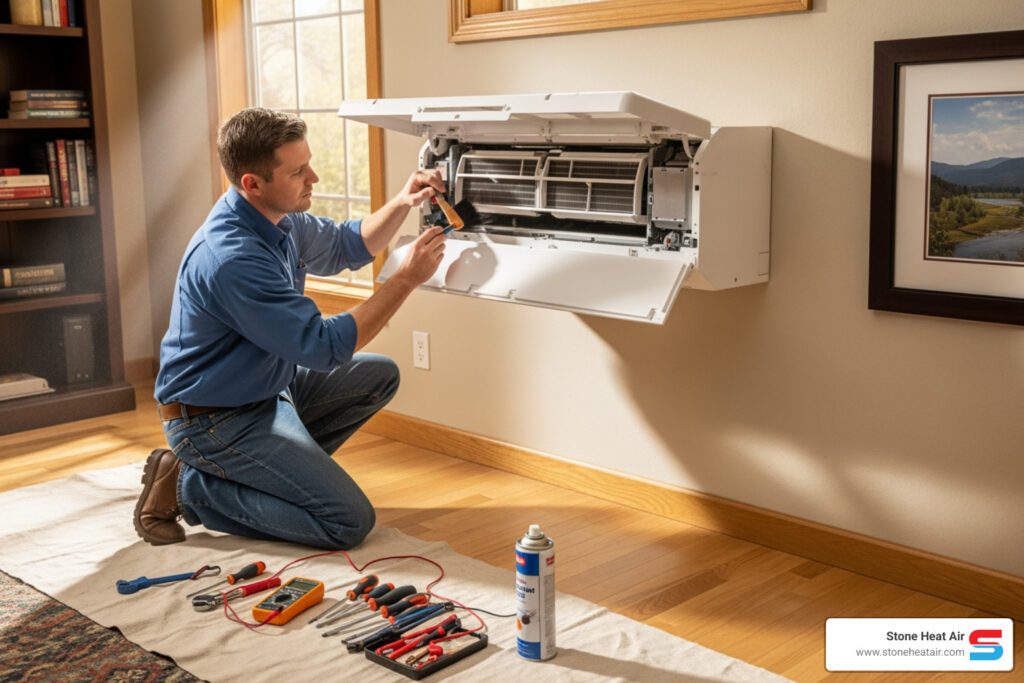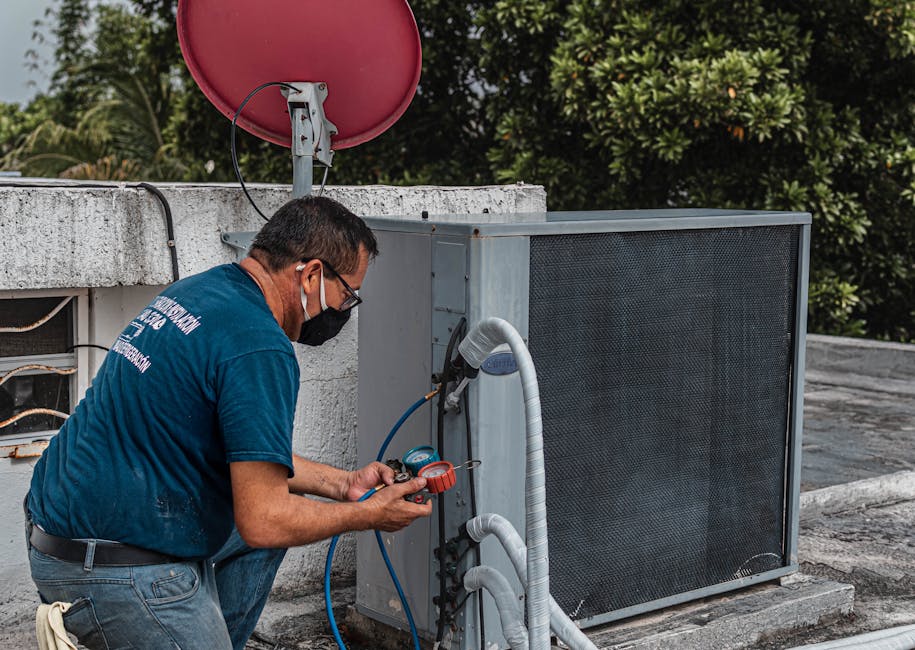Shopping for a New Furnace in Southern Oregon?
While enjoying the last weeks of warm summer weather, it’s easy to forget that the cold months are just around the corner. But as any experienced homeowner knows, the time to prepare for winter isn’t when the first frost hits—it’s well before the temperatures start to drop. If your furnace shows signs of wear or isn’t keeping your home as warm as it once did, now is the perfect time to shop, select, and install a new system. Acting early ensures you’ll stay warm all winter long and avoid the rush when everyone else realizes they need a new furnace. Our experts at Stone Heating and Air are here to make shopping for a new furnace in Southern Oregon a breeze, and we’ll have it installed in time for the cold weather.
 At Stone Heating and Air, we understand that choosing a new furnace can feel overwhelming. With numerous options available, making the right choice for your home requires careful consideration. That’s why our expert staff is here to guide you through every step, from selecting the best system for your needs to ensuring a professional installation that guarantees comfort and efficiency for years to come.
At Stone Heating and Air, we understand that choosing a new furnace can feel overwhelming. With numerous options available, making the right choice for your home requires careful consideration. That’s why our expert staff is here to guide you through every step, from selecting the best system for your needs to ensuring a professional installation that guarantees comfort and efficiency for years to come.
Why Now Is the Best Time to Shop for a New Furnace in Southern Oregon
Shopping for a new furnace in the summer or early fall might not seem urgent, but there are several compelling reasons to start the process before the cold weather sets in:
1. Avoid the Winter Rush: Furnace issues become more apparent once the temperatures drop. Many homeowners wait until their heating system fails, leading to a surge in demand for new installations. By shopping early, you can avoid long wait times and potential delays in getting your new furnace installed.
2. Better Selection: As demand increases, the availability of certain furnace models may decrease. Shopping early allows you to choose from a broader range of options, ensuring you get the best system for your home.
3. Seasonal Discounts: Manufacturers and retailers often offer discounts and promotions during the off-season. Purchasing your furnace now could save you a significant amount of money.
4. Time for Professional Consultation: Choosing the right furnace isn’t just about selecting the most powerful or expensive model. It’s about finding the system that best fits your home’s size, insulation, and your family’s heating needs. By shopping early, you give yourself the time to consult with professionals who can help you make an informed decision.
Choosing Between a Gas and Electric Furnace
When choosing a furnace for your home, one of the most significant decisions you’ll need to make is whether to go with a gas or electric model. Both types of furnaces have their advantages and disadvantages, and the right choice depends on various factors, including your climate, budget, and energy efficiency goals. Below, we’ll compare gas and electric furnaces to help you make an informed decision.
Initial Cost
Electric Furnaces: Electric furnaces generally have a lower initial cost than gas furnaces. They are also simpler to install because they don’t require gas lines or exhaust systems, which reduces the installation cost.
Gas Furnaces: Gas furnaces tend to be more expensive upfront, both in terms of the unit itself and the installation. The need for gas lines and proper ventilation adds to the overall cost.
Operating Costs
Electric Furnaces: While electric furnaces are cheaper to install, they can be more expensive to operate, especially in areas with high electricity rates. Electricity typically costs more per unit of energy than natural gas, leading to higher monthly heating bills.
Gas Furnaces: Gas furnaces generally have lower operating costs because natural gas is usually less expensive than electricity. Over time, the lower fuel cost can offset the higher initial investment.
Efficiency
Electric Furnaces: Electric furnaces are highly efficient in converting electricity into heat, often boasting 95% to 100% efficiency ratings. This means almost all the electricity consumed is converted into heat. However, the source of the electricity matters—if it comes from fossil fuels, the overall environmental impact may not be as low as the efficiency rating suggests.
Gas Furnaces: Gas furnaces are also efficient, with modern models reaching efficiency ratings of 90% or higher. However, some energy is lost through the exhaust, making them slightly less efficient than electric furnaces in energy conversion. Despite this, the lower cost of natural gas often makes them more cost-effective overall.
Performance in Cold Climates
Electric Furnaces: Electric furnaces can struggle to provide sufficient heat in extremely cold climates. They heat air more slowly than gas furnaces, which means they can take longer to warm up a home. In very cold conditions, this can result in less comfortable indoor temperatures.
Gas Furnaces: Gas furnaces excel in cold climates. They heat air quickly and can maintain comfortable temperatures even during the harshest winter weather. This makes them a preferred choice for homeowners in colder regions.
Lifespan and Maintenance
Electric Furnaces: Electric furnaces generally have a longer lifespan, often lasting 20 to 30 years with proper maintenance. They have fewer moving parts, which reduces the likelihood of breakdowns and lowers maintenance costs.
Gas Furnaces: Gas furnaces typically last 15 to 20 years. They require regular maintenance to ensure safe operation, including checking gas lines and exhaust systems. Neglecting maintenance can lead to safety hazards, such as carbon monoxide leaks.
Environmental Impact
Electric Furnaces: The environmental impact of electric furnaces depends largely on how the electricity is generated. If your electricity comes from renewable sources, an electric furnace can be a very eco-friendly option. However, the environmental benefits are reduced if your electricity is generated from coal or natural gas.
Gas Furnaces: Gas furnaces emit carbon dioxide and other greenhouse gases, making them less environmentally friendly than electric furnaces, particularly if your electricity comes from renewable sources. However, natural gas is a cleaner-burning fossil fuel compared to coal or oil.
How a Heat Pump Impacts Your Furnace Decision
If you’re considering a heat pump, it’s essential to understand how it will impact your overall heating strategy. A heat pump alone might suffice for your heating needs in milder climates. However, when temperatures regularly drop below freezing, a heat pump may need to be supplemented with a gas furnace or electric resistance heating to maintain comfort.
A dual-fuel system, which combines a heat pump with a gas furnace, offers the best of both worlds. The heat pump provides efficient heating during milder weather, while the gas furnace kicks in during colder periods when the heat pump’s efficiency decreases. This approach maximizes energy efficiency while ensuring reliable heating in all conditions.
Trust Stone Heating and Air When You Shop for a New Furnace in Southern Oregon
Choosing the right furnace or heat pump is a big decision that can have a lasting impact on your home’s comfort and your energy bills. That’s why it’s essential to get professional advice from experts who understand the complexities of heating systems when you shop for a new furnace in Southern Oregon.
At Stone Heating and Air, our team of experienced technicians is dedicated to helping you find the perfect heating solution for your home. We take the time to assess your specific needs, explain your options, and recommend the best system for your budget and lifestyle. Once you’ve made your selection, our skilled installers ensure that your new furnace or heat pump is installed correctly and efficiently so you can enjoy a warm, comfortable home all winter long.
Don’t Wait—Schedule Your Consultation Today!
As the temperatures start to cool, demand for new furnaces will only increase. Don’t wait until you’re left in the cold. Contact Stone Heating and Air today to schedule a consultation and take the first step toward a warmer, more comfortable home. Our experts are ready to help you choose and install the perfect heating system to keep you cozy all winter long.
Category: Furnace, Furnace Replacement
Request An Appointment
Related Content



